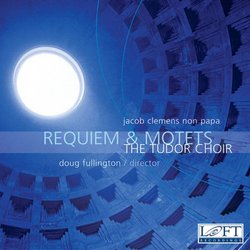| All Artists: Doug Fullington, The Tudor Choir Title: Jacob Clemens Non Papa: Requiem & Motets Members Wishing: 0 Total Copies: 0 Label: Loft Recordings Release Date: 6/14/2005 Genre: Classical Styles: Opera & Classical Vocal, Historical Periods, Early Music Number of Discs: 1 SwapaCD Credits: 1 UPC: 617145107527 |
Search - Doug Fullington, The Tudor Choir :: Jacob Clemens Non Papa: Requiem & Motets
 | Doug Fullington, The Tudor Choir Jacob Clemens Non Papa: Requiem & Motets Genre: Classical
|
Larger Image |
CD Details |
CD ReviewsBeyond Seattle...A Superb Choir Leslie Breitner | Pacific Northwest | 11/05/2005 (5 out of 5 stars) "From GRAMOPHONE...."A superb choir make a splendid debut with works of ecstatic beauty" - "An hour and a quarter of musical bliss" - "Although something of a protégé of Peter Phillips, Doug Fullington cultivates a harder-edged sound than that familiar from The Tallis Scholars. Rhythms and counterpoint are clearer and the mystic glow of the music is to a large extent allowed to take care of itself - something it does admirably" - "Let us hope this is the first of many recordings of this repertoire by this superb group." " Valiant Effort to Resurrect a Great Composer Giordano Bruno | Wherever I am, I am. | 12/04/2007 (3 out of 5 stars) "The album notes describe the Tudor Choir as "a professional vocal chamber ensemble based in Seattle." Anyone involved in the music economy might suspect that the ensemble has a professional director indeed, but that most of the singers are semi-professionals or amateurs. It's still a glorious world in which quite musical amateurs can muster the enthusiasm to concertize, and the Tudor Choir produces a resonant, well-tuned, rhythmically disciplined performance of challenging Renaissance polyphony. Bravo to them! But that's the sum of what they do with the music; there are levels of subtlety and interpretational flexibility which are beyond their skills. The result is that the Requiem and the seven motets performed with it sound rather generic.
Even a choir of twelve to fifteen voices is probably too large, and therefore too soft, for this polyphony. What I mean is that the blending of voices softens the definition of pitch and timbre, and only the very most professional of choirs can avoid the trap of sounding "sonorous" at the expense of musical excitement. Even full-time choristers in choir-happy England fall into that trap at times. The problem is exacerbated by the limits of recording technology; the more voices being recorded, the less human they sound. The Tudor Choir also has the problem of being a mixed choir of women's voices and men's. The women in this choir probably exceed the men in vocal training, but the two kinds of voices don't blend so much as ride on top of each other. I don't have the scores of Clemens's music at hand, but I wonder if it wouldn't have been sung at a lower pitch. Even when Renaissance polyphony was notated in very high ranges, it was common practice for all-male choirs to transpose the whole piece down a fourth. Also, boys' voices didn't break until 15 or older - this is a well documented fact - and thus there were very skilled and experienced boy singers who could easily cover the range of most women choristers today. The ideal of recorded performance of this kind of music in our times is represented by ensembles such as The Orlando Consort - all men, one on a part. The "sample" function on amazon is wonderful! I use it recreationally. I seldom buy anything by an unknown ensemble these days unless I can hear some tidbits. But sometimes one can be deceived. Listening to the samples of this CD, I expected a more polished and 'affective' performance. I'm glad to have the Requiem in my collection; there are only two CDs available devoted entirely to Jacob Clemens Non Papa. But I wouldn't hasten to recommend this CD to anyone trying to develop a taste for and understanding of Renaissance polyphony." |

 Track Listings (15) - Disc #1
Track Listings (15) - Disc #1